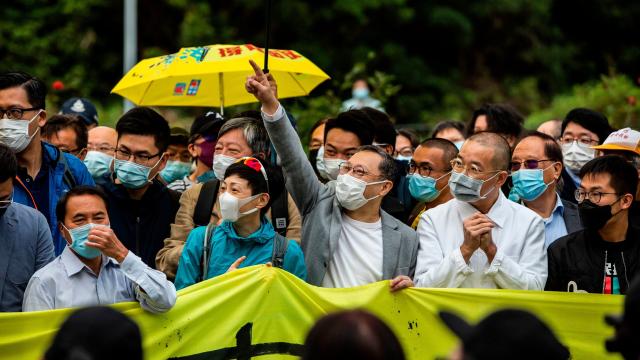A court in Hong Kong largely upheld a ban on face masks at illegal assemblies on Thursday, despite the ongoing coronavirus pandemic—though it also found that bans at legal assemblies or allowing police to demand that people remove their masks violates the special administrative region’s constitution, per the Guardian.
The bans were implemented under colonial-era emergency laws, according to the paper, last fall as mass protests broke out against Chief Executive Carrie Lam’s government over widely detested plans to allow extradition to the Chinese mainland. Applying to all gatherings, violators could face penalties as stiff as one year in jail and a fine of HK$25,000, though it contained exemptions for health, religious, and occupational reasons that weren’t clearly defined and created ambiguity over who could be charged and why.
According to Reuters, this was the first time such powers were asserted in over half a century. Lam characterised the protests as a “public danger”; while the court found that she has the ability to do so, it disagreed on whether that meant she could do anything in response.
[referenced url=” thumb=” title=” excerpt=”]
Lam’s government lost an initial case in November 2019. The decision infuriated Chinese authorities who were concerned that ongoing protests in Hong Kong would undermine the government’s influence and the proceeded to raise the prospect that the People’s National Congress would intervene, severely damaging the special administrative region’s level of autonomy. Lam’s administration appealed, resulting in the second ruling from a different court on Thursday.
“The violence and damage are mostly caused by protesters wearing masks and dressed in black outfits,” Thursday’s court judgment read, according to the Guardian. “At the same time, it is a common phenomenon that many other protesters participating in public assemblies and processions who are not involved in violence are also wearing masks and dressed in black outfits.”
[referenced url=” thumb=” title=” excerpt=”]
While Lam was “evidently the only suitable person to make the call” about a public danger, the court ruled that “it does not follow that the [chief executive] could act freely without any rein as she wishes… total ban of facial coverings from all public demonstrations, processions and gatherings cannot pass the test of reasonable necessity even in the context of the public danger in which the [anti-mask law] is meant to address.”
Dennis Kwok, a legislator in Hong Kong, told Reuters that the courts had merely created greater confusion by finding masks legal in some situations and not in others, all at a time when authorities should be focusing on halting the spread of the novel coronavirus.
“It creates lots of fear and confusion, so there’s only one solution, I call upon Chief Executive Carrie Lam to repeal this law,” Kwok told Reuters.
Hong Kong’s Security Bureau told the South China Morning Post that armed protesters “continue to cause serious concerns” and that the mask ban’s purpose was to “strengthen the deterrent effect against radical protesters .” Former Legislative Council member and social activist “Long Hair” Leung Kwok-hung told the paper that he was disappointed the appeals court did not clarify what exactly a “public danger” is: “The definition of ‘public danger’ is too wide, it will allow the chief executive to abuse his or her power.”
According to the Post, Hong Kong police said that 682 people had been arrested under the ban, with 61 convicted.
The number of confirmed coronavirus cases in Hong Kong has now risen to over 970, according to the Johns Hopkins School of Medicine tracker, with four deaths. Most of the region’s nearly 7.4 million residents have worn masks in public, and community transmission is suspected to be linked to those who have let up their guard and taken them off at hospitals or work.
